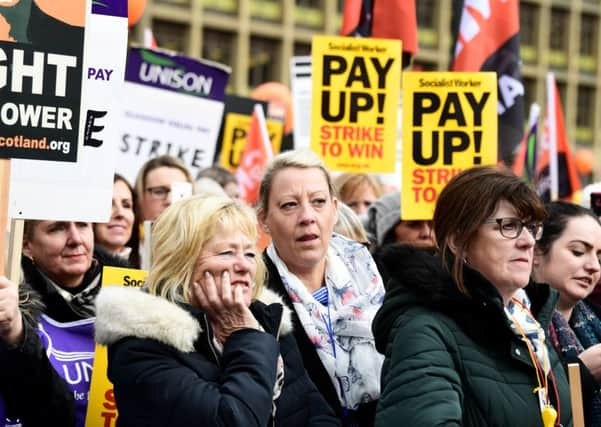Gender pay gap hits Scottish part-time workers hard


And despite the pay gap between Scots men and women in full-time work now being the lowest in Britain, there has not been any official improvement in 2018.
The biggest gap in pay between the sexes is in the highly-paid finance industry, where men can expect to earn a third more than their female counterparts, according to the report by Holyrood researchers.
Advertisement
Hide AdAdvertisement
Hide AdThe problem has been branded an “indictment” of Scots society which must be tackled the Scottish and UK governments.


Ministers say a new national “gender pay gap action plan” is to be devised along with a series of initiatives to help women return to the workplace.
Despite progress in recent years, women continue to suffer lower pay levels than men. Just last week, Glasgow City Council backed a £500 million deal to settle a case with hundreds of women who faced discrimination stretching back more than a decade.
But Anna Ritchie Allan, executive director of Close the Gap, which campaigns on gender pay, warned that progress is not happening quickly enough.
“Another year passes with little change in women’s experiences of work which finds them clustered into undervalued, low-paid jobs such as cleaning, caring and retail,” she said. “We know the lack of quality part-time work particularly affects women, and results in their persistent under-representation in higher-paid, management and senior positions.
“The pay gap is an endemic problem which requires a cohesive, strategic response. Close the Gap has enthusiastically welcomed Scottish Government’s commitment to develop an action plan to tackle Scotland’s stubborn gender pay gap. It’s time to translate the rhetoric around the pay gap into substantive action.”
The average full-time salary for all Scots last year was £23,833 and £10,686 for part-time workers.
The country had smallest gender pay gap for full-time workers in Britain of 5.7 per cent in 2018 – a record low for Scotland – and compares with a UK average of 8.6 per cent, says the report by the Scottish Parliament Information Centre (SPICe).
This was down 0.9 per cent between 2017 and 2018.
Advertisement
Hide AdAdvertisement
Hide AdScotland also compares well on pay across all employees, with a gap of 15 per cent the lowest on record and below a UK average of 17.8 per cent.
But part-time workers are three times more likely to be women with average pay of £195 a week. Here the pay gap is 7.8 per cent which is the worst across the UK outside London, according to the report entitled “The Gender Pay Gap: Facts And Figures – 2018”.
Grahame Smith, general secretary of the Scottish Trades Union Congress, called for a culture change in attitudes towards work carried out by women.
“Scotland’s women have waited far too long to get fairness in pay,” he said.
“The under-valuation of ‘women’s work’ is at its heart. Closing the gap must therefore involve increasing the pay of low-paid, female-dominated occupations such as carers, cleaners, clerical workers, and catering assistants.
“Unions are crucial to addressing the gender pay gap, and women benefit particularly from the trade union wage premium – with women trade union members earning 22 per cent more than women who are not in a trade union. As the Equal Pay campaign in Glasgow showed, when women workers come together, make demands and take action, they win.”
The problem is worse for women over the age of 40, where the pay gap suddenly rises to 19.2 per cent from 6 per cent in their thirties. Females in their 50s face the worst discrimination with a pay gap of 25.3 per cent. This could partly be down to many women returning to the workplace after having taken time out to have a family.
The banking and finance industry is among the highest paid sector in Scotland and has more men working at “professional” level and in “sales and customer services” departments. Men can expect to be paid more than £20 an hour in this industry, while women are more likely to make less than £14.
Advertisement
Hide AdAdvertisement
Hide AdGraeme Jones, chief executive of Scottish Financial Enterprise (SFE), said the industry is committed to changing the “historically low representation of women at senior levels”.
“The figures in this report show that action is needed, but it is also important to appreciate they are part of addressing a long-standing problem and should be viewed alongside positive initiatives being taken to address disparities.”
Labour’s equalities spokeswoman Pauline McNeill warned that inequality is holding back Scotland’s growth and called for ministerial action.
“The continued existence of the gender pay gap is an indictment of our society,” she said.“Closing the gap isn’t just a question of fairness, it is essential to unlocking our country’s economic potential.”
A Scottish Government spokesman pointed to falling pay gaps affecting women in full-time work and said ministers were determined to “reduce this further”.
“We are investing £5 million over the next three years to support around 2,000 women returning to work following a career break, and we continue to fund Close The Gap with £205,000 to challenge and change employment practices and workplace cultures,” he said.